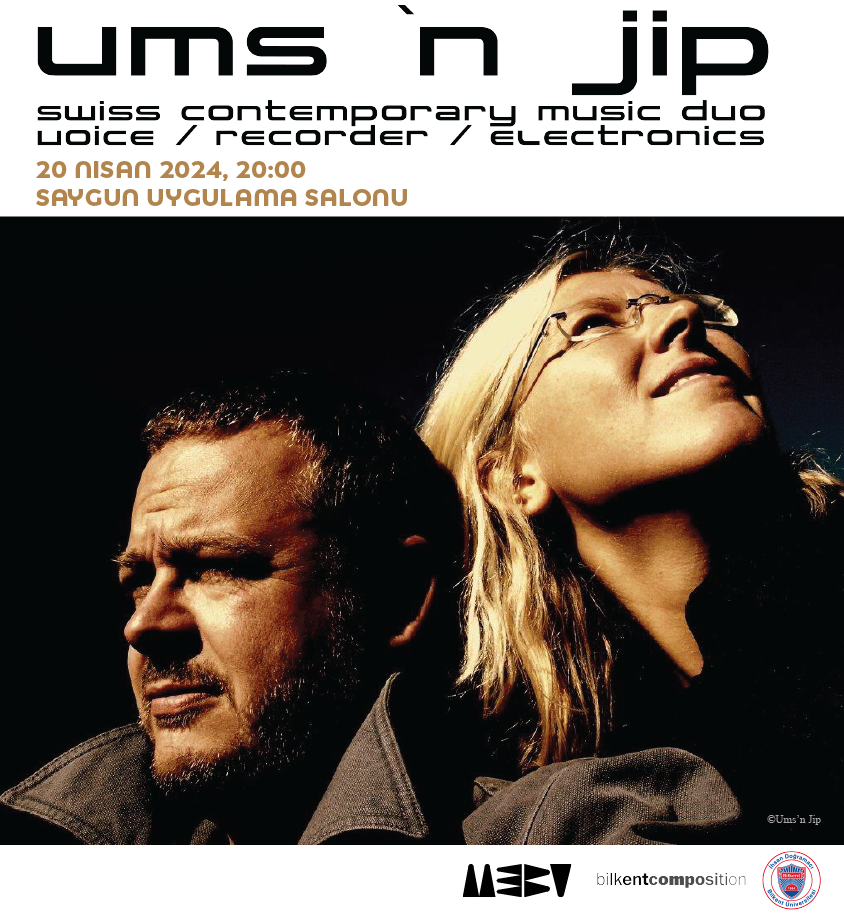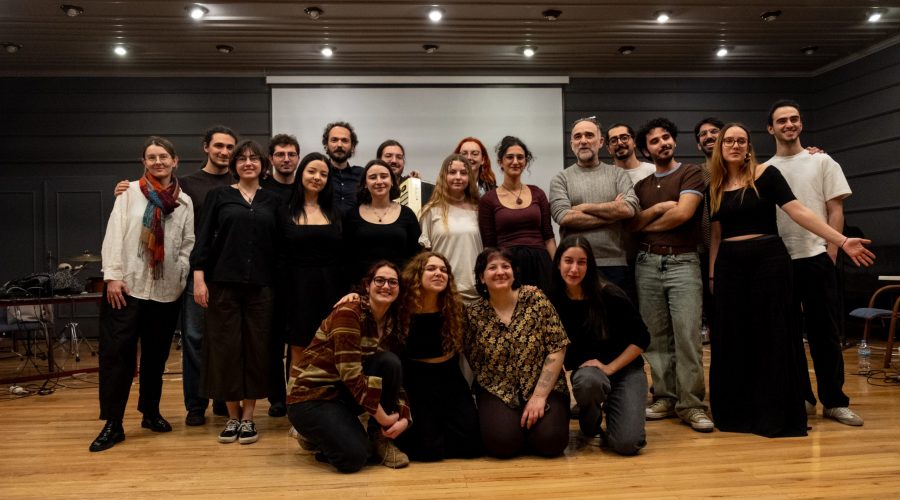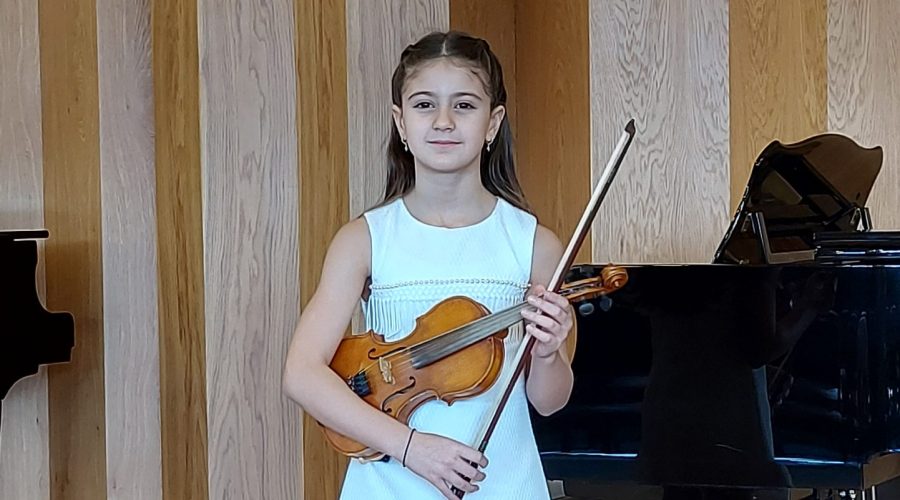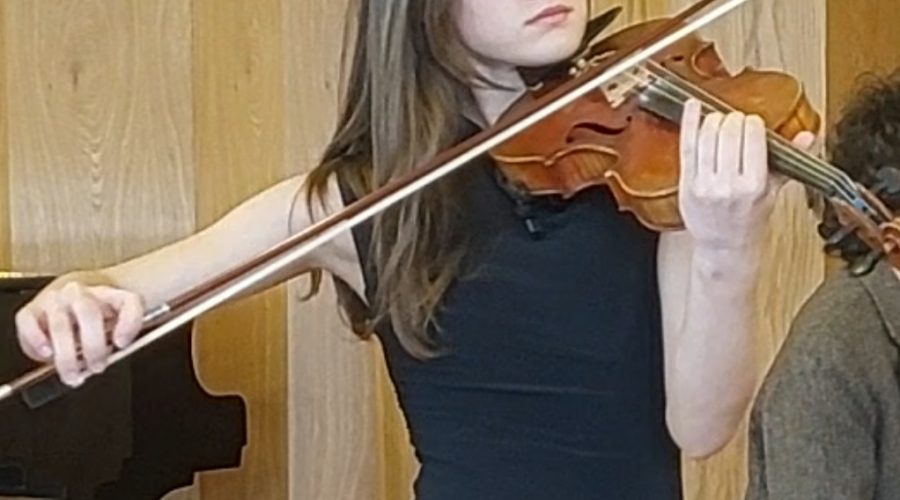20 April 2024, 20:00
A.A. Saygun Uygulama Salonu
UMS ‘n JIP
Ulrike Mayer-Spohn (UMS), recorders & electronics and
Javier Hagen (JIP), voice & electronics.
PROGRAM
Motoharu Kawashima (*1972, JPN)
Das Lachenmann IV, 2017
Tokzhan Karatai (*1994, KAZ/TUR)
The Lost Energy, 2023
Beat Gysin (*1968, CHE)
Der Spanier, 2007
UMS (*1980, CHE)
In D, 2011
Georges Aperghis (*1945, FRA)
from: Récitations pour une voix seule, 1977/78
Luciano Berio (1925-2003, ITA)
Gesti, 1966
Luis Codera Puzo (*1981, ESP)
oscillation ou interstice, 2013
JIP (*1971, CHE)
eeiiuü-bccghhkknrrtz (ich bin zurückgekehrt), 2020
Deniz Hatipoğlu (*2003)
Düş Kapanı, 2023
UMS’nJIP are a Swiss contemporary music duo based in Münster (Valais/Switzerland) at the foot of the Finsteraarhorn and the Rhone Glacier, consisting of Ulrike Mayer-Spohn (UMS) on recorders & electronics and Javier Hagen (JIP), voice & electronics. One of the most experienced and distinguished contemporary music laboratories of our times, they work as composers, performers and organizers within a global network of composers, visual artists, stage directors, researchers, universities and festivals. Their special interest in long term collaboration, with its exchange of knowledge and awareness, brings context to new creations and results in an outstanding increase of artistic content. In this manner, UMS’nJIP explore new settings for voice, recorders and electronics, ranging from live to digital performance in concert, scenic or installative formats and often integrate European as well as non-European music. UMS’nJIP have been invited to perform at prestigious contemporary music festivals around the world including Zürich, Lucerne, Donaueschingen, Stuttgart, Berlin, Paris, Venice, Barcelona, Athens, Istanbul, Cairo, Moscow, Shanghai, Hong Kong, Seoul, Tongyeong, Tokyo, Buenos Aires, Mexico City, and New York. They have premiered hundreds of works, collaborating with both world famous and aspiring young composers such as Heiner Goebbels, Wolfgang Rihm, Mauricio Kagel, Jennifer Walshe, Wolfgang Mitterer, Erik Oña, Luis Codera Puzo, Chikashi Miyama, Du Yun, Huang Ruo and Guo Wenjing. They can look back on more than 1300 concerts since their debut in 2007 and are one of the most active contemporary music ensembles worldwide, bringing both young and established works not only to famous venues but also to audiences who do not have easy access to live performances of top quality contemporary music. Both individually and as a duo UMS and JIP have received numerous commissions and awards and have been invited to share their knowledge in renowned universities in Europe, America and Asia. JIP is also the director of the Swiss Contemporary Music Festival Forum Wallis and the current president of ISCM Switzerland, he serves as well the boards of the European Conference of Promoters of New Music ECPNM (2014-8), the Swiss Music Edition, and of the UNESCO Commission for the Inventory of Intangible Cultural Heritage in the Canton of Valais (2009-18). Since 2013 UMS has been pioneering two research projects: Recorder Map and Recorderology, and the duo has been invited to act as experts in the European Union’s FP7 i-Treasures project.
A high performance small scale contemporary music laboratory and global network – Although UMS’nJIP do handle an impressive workload, their aim is not to premiere as much as possible but to perform new works as often as possible – since works basically grow by being performed. At a time in which it is increasingly difficult to defend reflective, not primarily commercially-oriented music, UMS’nJIP maximize artistic adventurousness by reducing economic risk to a minimum: Strict adherence to a small cast, supported by exceptional and internationally recognized experience, expertise, versatility, agility and unique ness means that UMS’nJIP can call themselves one of the most active contemporary music ensembles worldwide, alongside Ensemble Modern, Intercontemporain and Kronos Quartet. The large number of performances implies a remarkably high performance rate of new works (up to 100 performances per work, well above the global average for classical contemporary music < 5), and, more important, this deeply benefits the performance quality and emotional impact of the performed works. Thanks to the consistently small scale of their projects, UMS’nJIP can achieve their projects with both great flexibility and irregular financing, especially in countries where new music is in a politically and financially difficult position and the featuring of high quality new music is particularly important in concerts and teaching. Fully aware that creativity cannot only be brought to society by performances but also by active participation in cultural politics, UMS’nJIP are also involved in different local, national and international structures. Within these structures, they have initiated more than 500 further projects and commissions since 2006.






